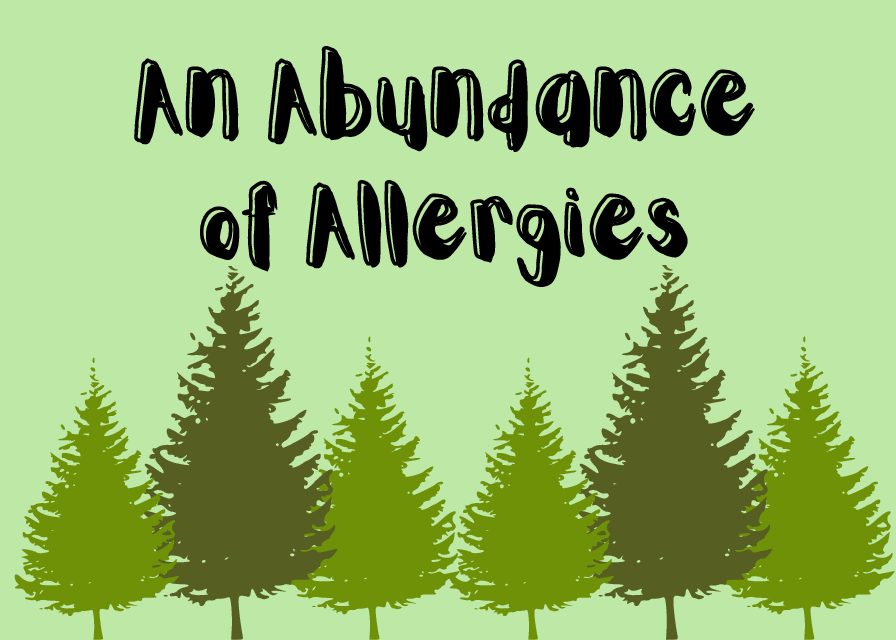AN ABUNDANCE OF ALLERGIES
Diving into the types of allergies and preventable techniques to help stop them
Allergies always seem to come at a bad time. Flu-like symptoms spread throughout schools and workplaces during the year, with many people missing days to take care of their persisting problems. But what are allergens? What causes these irritating hindrances? And what treatments can you use to take care of allergies?
Understanding Allergens
Allergens are inhalants, ingestants, or injections that “can cause an allergic reaction to occur”. (Vorvick) Doctor Vorvick goes on to say, “In some people, the immune system recognizes allergens as foreign or dangerous. As a result, the immune system reacts by making a type of antibody called IgE to defend against the allergen. This reaction leads to allergy symptoms.”
Inhalants include pollen, house dust, mold, and animal dander, ingestants are foods, drinks, or prescriptions, and vaccines, drugs, or insect venom are kinds of injection allergens. (AACA) All of these can cause allergic reactions which vary between people.
Seasons of Sniffles
Many places in the U.S. experience allergy chances with the changing seasons. In fall from mid-August to early November, common allergens include different types of weeds, such as ragweed. (AACA) The winter months of December to February are when Mountain Cedar becomes most problematic, though this is mostly in Central Texas where cedar trees are abundant. “Cedar pollen counts in Central Texas are the highest pollen counts of any plant anywhere in the world,” as stated by the Allergy and Asthma Center of Austin. This allergy is usually referred to as “Cedar Fever” and is one of the most common and most severe seasonal allergies. In springtime from February to early June trees and grasses bring issues, with oak, ash, elm, and pecan trees being some of the worst, and “grasses pollinating from March through September”. (AACA) Every season includes allergens that bring trouble to people all over the world.
Sinister Symptoms
Common symptoms include runny/stuffy nose, itchy/sore and congested throat, itchy/burning/watery eyes, headache, and itchy skin. Extreme symptoms include swelling of the tongue, mouth, and throat, dizziness, vomiting, diarrhea, cramps, and hives. Some people experience all of these, but most only have mild symptoms.
Terrific Treatments
The most common way to avoid allergies is to avoid the allergen itself. Choosing to stay inside on a high pollen count day is important, especially for those with strong allergies. Another choice is to take medication provided by your allergy doctor. These offices provide an allergy test to find what allergen you are most triggered by, and work to give you a treatment to help your body adapt. Some over-the-counter prescriptions are available as well, including Allegra, Zyrtec, and Claritin which are pills, and Flonase which is a nose spray. Allergy shots are also an option for those with extremely severe allergies. AACA notes that “The injection of increasingly stronger concentrations of specific allergens can lead to a gradual reduction in allergic symptoms.” These can decrease the necessity of medications and provide you with long-term relief. All of these are different kinds of treatments that can help depending on your needs.
Owls’ Observations
Here are some of our owls’ encounters with allergies:
One owl has allergies in every season and is allergic to grasses, trees, and weeds. They say they experience a snotty nose, sneezing, and sore throat during this time, and take Flonase and Xyzal to overcome their issues.
10th grader Caleigh England has allergies during the fall, spring, and summer months, with grasses, trees, weeds, and pollen being a big factor. She takes Flonase to battle, “Itchy ears, nose and throat, watery eyes, runny nose and congestion in throat, and sometimes an ear infection.”
“Runny nose/stuffy nose, watery eyes, [and] post nasal drip cough,” are troubles one owl faces during spring. They take a bold course and choose to just “let it run its course”, instead of taking any treatments.
Maddox Rogers is another 10th grader who gets allergies. She takes eye drops and over-the-counter meds to combat her, “Eye itches, sneezes, skin itches, and… [occasionally] a sore throat,” during the spring and summer months.
Another owl gets allergies during all seasons with “Watery/dry eyes, sore throat, sinus headaches, ear infections, runny/dry nose, [and] bloody noses” being their main symptoms. They use “prescription nose spray, Benadryl, [and] anti-histamines” to take care of their symptoms.
Sophomore Brooke Bolinger gets a stuffy/runny nose, sore throat, and itchy eyes, “mainly during the winter but sometimes in spring as well.” She takes, “Flonase, Olopatadine (nose spray), and Montelukast (pill) every night” to get rid of her symptoms.
Many of our owls get allergies but have great recommendations of treatments to help them. See for yourself what medications are available, and find ones that work for your needs, just as our owls have!
Allergy season is a tough time for many people, but we can always find a way to protect ourselves against what comes. Medications are always obtainable at your local H-E-B, CVS, or any convenience store near you, and are especially important when allergens are high. Take the time today to research and find what allergens you are most allergic to, or go to a doctor that can help you discover something that works best for you. Stay safe, Texas!
Citations:
AACA. “AACA: Allergy Information for Austin, TX.” Allergy & Asthma Center of Austin, Allergy & Asthma Center of Austin, 2 Aug. 2017, https://nosneezes.com/resources/#:~:text=In%20the%20fall%2C%20ragweed%20and,pollinate%20from%20March%20through%20September.
Kerr, Michael. “List of Top Pollen Offenders.” Healthline, Healthline Media, 13 Nov. 2018, https://www.healthline.com/health/allergies/pollen-library.
Vorvick, Linda J. “Allergen: Medlineplus Medical Encyclopedia.” MedlinePlus, U.S. National Library of Medicine, 16 Jan. 2021, https://medlineplus.gov/ency/article/002229.htm.

Hi everyone! My name is Brooke Bolinger and I am one of the Co-Associate Editors this year!! This is my 4th year at iUP and I am a senior...








Eve Bamber • May 14, 2022 at 3:55 pm
I have never related so much to an article, haha! Brooke does it again, conquering what may be a boring topic, and still making it interesting! Great work, Brooke!